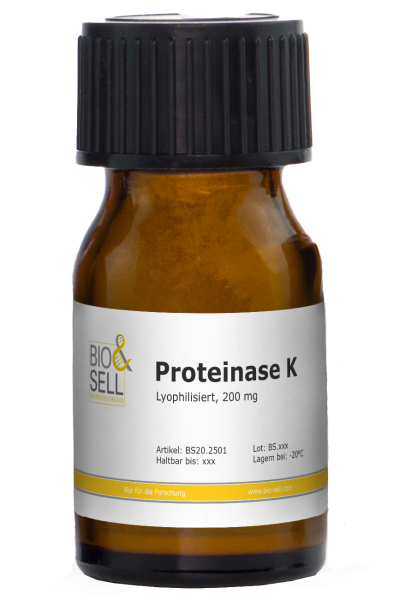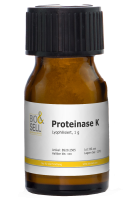Proteinase K, 200 mg

Prices plus VAT plus shipping costs
Delivery time approx. 5 working days
- Article number BS20.2501
Proteinase K (200 mg)
Lyophilized, ≥ 30 U/mg; Recombinant enzyme; Expressed in Komagataella phaffii (Pichia pastoris); MW: 28.9 kDa
Synonym(s)
Endopeptidase K, Pro-k, Proteinase K
Product description
Our proteinase K is a non-specific serine protease with a very high proteolytic activity (30 U/mg). The enzyme was expressed in Komagataella phaffii (Pichia pastoris) and is free of endogenous nucleases (DNAses, RNAses) and exonucleases. Due to its high efficiency in the digestion of native proteins, the protease is very well suited for the isolation of genomic DNA from cultured cells or tissue (e.g. mouse tails) and for the reliable inactivation of endogenous nucleases (DNAses, RNAses) during DNA/RNA preparation.
Properties
- High stability in a wide pH range (4.0 - 12.5; optimal at pH 7.5 - 8.0)
- High activity at temperatures up to 56°C and under denaturing conditions (active in the presence of SDS, urea and EDTA)
- High effectiveness at low dosage (50-100 µg/ml sufficient for most applications)
Good to know
Proteinase K is secreted by cultures of the mold Tritirachium album and naturally serves the keratin digestion ('K') of the fungus to cover its carbon and nitrogen balance. Proteinase K is structurally stabilized by Ca2+ ions and preferentially cleaves peptide bonds of aliphatic, aromatic or other hydrophobic amino acids (C-terminal). In the absence of Ca2+ ions, proteinase K shows a slightly reduced activity. However, the overall activity remains high, which is why proteinase K digestion can also be carried out in the presence of EDTA. Denaturing agents such as SDS or urea serve as activators for the enzyme. Protease activity is inhibited by Hg2+ ions, DFP, PMSF, phenol, sulphydryl reagents and trypsin or chymotrypsin inhibitors.
You can find application examples of Proteinase K under FAQ!
Category: Serine endopeptidase (hydrolase)
EC number: 3.4.21.64
Reaction type: Proteolytic cleavage
Molecular weight: 28.9 kDa
Organism of origin: Tritirachium album
Expression organism: Komagataella phaffii (Pichia pastoris)
Form: Lyophilizate (white powder)
Purity: Protein content > 70%
DNA content ≤ 10 pg/mg; ≤ 200 pg/ml
Activity: ≥ 30 U/mg (1 U = 1 mAnsonU)
One U proteinase K hydrolyzes urea-denatured hemoglobin and produces the color equivalent of 1 µmol tyrosine per 1 min at 37°C and pH 7.5 (Folin & Ciocalteu's method)
Stability: pH 4.0-12.5 (pH optimum: 7.5 - 8.0); also stable in the presence of denaturing agents (SDS, urea).
Ca2+ ions (1-5 mM) protect the enzyme from autolysis.
Activators: SDS, urea (activation by self-digestion is not necessary)
Inhibitors: Hg2+ ions, PMFS, phenol, DFP, trypsin or chymotrypsin inhibitors, sulfhydryl reagents
Thermostability: active at 37-56°C (optimum activation at 50-55°C)
Inactivation: heat denaturation at 75°C for 20 min
Storage: -20°C
Solubilization: 20 mg/mL: Dissolve in 50 ml distilled water
20-50 mg/mL: Dissolve in a defined volume in 50 mM Tris-HCl (pH 7.5 - 8.0), 1-5 mM Ca2+ (calcium chloride, calcium acetate)
or 10 mM Tris-HCl (pH 7.5 - 8.0), 1-5 mM Ca2+ (calcium chloride, calcium acetate)
For long-term storage add 50% glycerol
Standard reaction buffer: Cell lysis: 50 mM Tris-HCl (pH 7.5), 5 mM CaCl2, 0.5% SDS
DNA purification: 100 mM Tris-HCl (pH 8.0), 50 mM EDTA, 500 mM NaCl
Safety: H315 + H319 + H334 + H317 + H335
P260 + P280 + P342 + P311
CAS number: 39450-01-6
1. how do I prepare a proteinase K stock solution?
20 mg/mL: Dissolve the lyophilizate in 50 mL distilled water for immediate use.
Filter the solution sterile and store aliquoted at -20°C.
20-50 mg/mL: Dissolve the lyophilizate in a defined volume in 50 mM Tris-HCl (pH 7.5 - 8.0), 1-5 mM Ca2+ (calcium chloride, calcium acetate)
or 10 mM Tris-HCl (pH 7.5 - 8.0), 1-5 mM Ca2+ (calcium chloride, calcium acetate) for immediate use.
Filter the solution sterile and store aliquoted at -20°C.
For long-term storage, add 50% glycerol.
2. for which applications do I need Proteinase K?
- Isolation of genomic DNA from mouse tails:
Buffer: 20 mM Tris-HCl (pH 8.0), 400 mM NaCl, 5 mM EDTA (pH 8.0), 1% SDS
Concentration: 400 µg/ml protease K
Duration: Overnight
Temperature: 55°C
- Isolation of genomic DNA from cultured cells:
Buffer: 10 mM Tris-HCl (pH 8.0), 50 mM NaCl, 100 mM EDTA (pH 8.0), 0.5% SDS, 20 µg/ml DNase free RNAse
Concentration: 100 µg/ml protease K
Duration: 3h
Temperature: 50°C
- Rapid isolation of genomic DNA (PCR template):
Buffer: 67 mM Tris-HCl (pH 8.8), 16.6 mM ammonium sulfate, 5 mM β-mercaptoethanol, 6.7 mM MgCl2, 6.7 µM EDTA (pH 8.0), 1.7 µM SDS
Concentration: 50 µg/ml protease K
Duration: 1h
Temperature: 37°C
- Purification of mRNA prior to cDNA synthesis (often increases the yield):
Buffer: 20 mM Tris-HCl (pH 7.5), 50 mM NaCl, 10 mM EDTA (pH 8.0), 0.1% SDS
Concentration: 5 µg/ml protease K
Duration: 1-2h
Temperature: 37°C
- Purification of PCR preparations before cloning:
Preparation: PCR assays + 20 mM Tris-HCl (pH 8.0), 400 mM NaCl, 5 mM EDTA (pH 8.0), 1% SDS
Concentration: 400 µg/ml protease K
Duration: overnight
Temperature: 55°C
- Purification of plasmid DNA before in vitro transcription:
Preparation: plasmid DNA + 21 mM Tris-HCl (pH 8.0), 50 mM NaCl, 5 mM EDTA (pH 8.0), 0.5% SDS
Concentration: 100 µg/ml protease K
Duration: 1h
Temperature: 37°C
 RevTrans QPCR One-Step Labeled Probes (No Rox),...
RevTrans QPCR One-Step Labeled Probes (No Rox),... 





